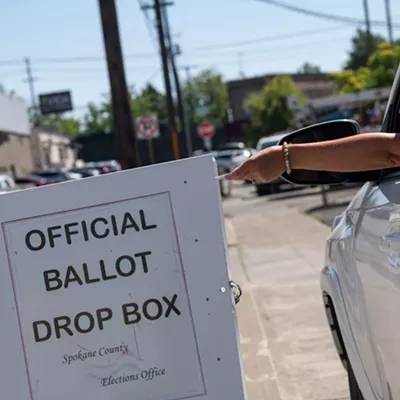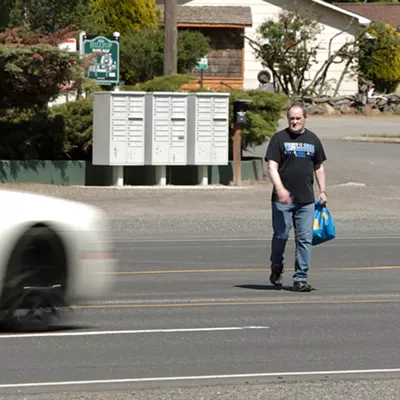Some on the right saw the news as a sign — a major piece of anti-pornography legislation was overturned by the Supreme Court exactly one day after Democratic President Barack Obama took office. Yup, there goes our moral fiber.
For whatever reason, sin and vice seem to have made frequent appearances in the news in the last month. Here’s a market analysis of some of the best bits, locally and nationally.
Booze [up]
Liquor is up, up, up. In New Hampshire, North Carolina and Florida, it’s the same story: Liquor sales are on the rise while the economy slumps.
“Wine, liquor, beer... They’re some of the great affordable luxuries that we have — especially in bad times,” Aaron Kreager, an employee at Total Wine in Palm Beach Gardens, Florida, told his local CBS station. “Anybody can go out and get a great bottle to take it home and make the day better.”
Idahoans’ days must be pretty great right now. Dyke Nally, Idaho’s liquor dispensary superintendent (we held that same title in college), says sales in the Gem State are up 4.7 percent over last year. He told state lawmakers that booze was a “recession-proof business, or at least recession-resistant.” But contrary to most media accounts, he says, it doesn’t appear to be laid-off workers pounding Pancho Villa. “People are purchasing better quality products. People are purchasing higher-end and more expensive products,” he told the Spokesman-Review.
But Nally also notes that sales in Idaho aren’t expected to equal last year’s rise. Same goes for the national trend. According to the Distilled Spirits Council of the United States, revenue reported by booze suppliers rose 2.8 percent last year, but that was below the annual 6 percent growth rate since 2000.
Still, in a time of deficits, growth is growth, and governments are riding the wave. Nally says Idaho has opened nine new state liquor stores in the past three years, and they’re currently proposing two more, in Post Falls and Meridian. Washington Governor Chris Gregoire has proposed opening 16 new liquor stores statewide, opening more stores on Sunday (Washington relaxed its laws to allow some Sunday sales in 2005) and allowing stores to stay open on seven holidays. The plan would net the state $21 million over two years.
And Washington and Idaho aren’t the only states looking to cash in. The Associated Press reports that Georgia, Texas, Connecticut, Minnesota, Indiana and Alabama are all weighing legislation that would open liquor stores on Sundays. (The six are among 15 states that ban it.)
Opening more stores on more days isn’t the only way to cash in, though. Several states have proposed taxing or increasing existing taxes on alcohol. This week, Idaho’s House Revenue and Taxation Committee voted to introduce a bill that would triple beer and wine taxes in the state.
Taxation aside, though, we’re bullish on booze.
Porn [steady]
State Senator Mark Miloscia (D-Federal Way) made waves last week when he proposed a bill that would levy an 18.5 percent tax on smut. But the proposal to tax porn sounds wobbly. After all, booze and smoking (which Washington has taxed for years) are relatively easy to define. But what gets the state hot and bothered?
Miloscia’s proposal, Senate Bill 2103, targets any materials and services that are “primarily oriented to an interest in sex, including but not limited to magazines, photographs, motion pictures, videotapes, videodiscs, cable television services, telephone services, audiotapes, computer programs, and paraphernalia.” It excludes books and magazines that contain no photographs or other graphics, as well as movies that would be rated anything below X.
That “including but not limited to” gray area may be crucial for a bill that includes audiotapes (who listens to dirty tape recordings?) but excludes, say, nudie playing cards. It also includes ill-defined “paraphernalia,” which leads us to guess that Miloscia had in mind dildos and vibrators — toys that certainly have “an interest in sex” but which are hardly pornography. And while it excludes books with no graphics, where would the bill come down on the earnest, educational (and modestly illustrated) Joy of Sex, or even the Kama Sutra?
Of course, the bill’s biggest exclusion is also its most necessary. While the state can tax the retail sale of skanky eight-tracks, it can’t touch the Internet, which has become the preferred means of acquiring pornography. Consider the numbers from an oft-cited 2006 study, which concluded that porn accounts for 12 percent of all Websites, a quarter of all search requests and 35 percent of all downloads. It adds that in 2006, Internet porn revenue totaled $2.84 billion, or $89 every second.
Miloscia proposes that proceeds from the tax would go directly to the state’s General Assistance Unemployable fund, which Gov. Gregoire slashed in her December budget proposal. But without the ability to tax the Internet, Miloscia’s bill would be as effective at saving the insurance fund as at stopping porn.
Weed [up]
Marijuana is looking good this year. Not only has the United States just elected a president who made no bones about his adolescent smoking habits, he is rumored to have picked Seattle police chief Gil Kerlikowske — a perceived progressive on drug policy — to head the Office of National Drug Control Policy.
But while Obama flip-flops on the issue of pot’s decriminalization, Washington state Senator Jeanne Kohl-Welles has introduced bills in the Senate to make the state, at least, more green-friendly.
Senate Bill 5615 would knock possession of less than 40 grams of pot down from a misdemeanor (which, if “gross,” could result in up to a year in jail, a $5,000 fine and a dark splotch on your record) to a class 2 civil infraction, with no jail time and a $100 penalty. Also, police officers would not have the authority to arrest a person whom they have probable cause to believe has or is using weed.
Penalty money from the civil infractions would go to fund a drug treatment program.
Kohl-Welles’ other bill, SB 5798, provides that health care professionals who prescribe medical marijuana (which has been legal in Washington since 1998) should be exempt from liability and prosecution. The bill would also make providers to those health care professionals exempt.
















